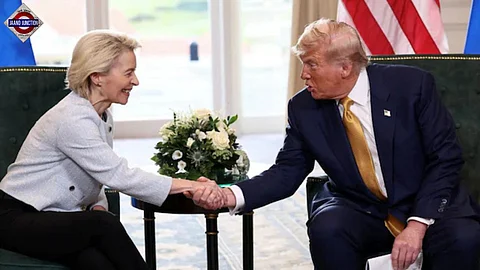

The United States announced the “biggest-ever" trade deal with the European Union on Sunday (local time), under which a 15% tariff would be levied on EU exports to the US.
The deal was struck during a meeting of US President Donald Trump and European Commission President Ursula von der Leyen at his golf resort in Scotland, as the deadline of August 1 to avoid an across-the-board US tariffs of 30% on European goods approaches.
“We’ve reached a deal. It’s a good deal for everybody. This is probably the biggest deal ever reached in any capacity," news agency AFP quoted Trump as saying.
Announcing the tariffs, Trump said that the 15% tariffs would apply across the board, including for Europe’s crucial automobile sector, pharmaceuticals, and semiconductors.
As part of the deal, the 27-nation EU bloc will purchase “$750 billion worth of energy" from the United States, Trump said, adding that they will also make additional investments of $600 billion.
Von der Leyen said that the EU would make large purchases of US liquefied natural gas, oil, and nuclear fuel over the next three years, as part of its effort to reduce reliance on energy from Russia.
Leyen, who negotiated the deal on behalf of the EU’s 27 countries, had been working hard to save the trade relationship with the US, which is worth $1.9 trillion a year in goods and services.
“It’s a good deal. It will bring stability. It will bring predictability. That’s very important for our businesses on both sides of the Atlantic," she told reporters.
She said that both sides had agreed to remove tariffs on several key products, such as aircraft, some chemicals, certain farm goods, and key raw materials. She said that the EU was still hopeful of securing “zero-for-zero" agreements, such as for alcohol, which she hoped to be “sorted out" in the future.
The EU has been struck by multiple waves of tariffs since Trump took over the White House in January this year. At present, it faces a 25% tax on cars, 50% on steel and aluminium, and a general 10% tariff. But the US had warned that this 10% rate could go up to 30% if no deal was reached.
The EU had been strongly pushing for tariff exemptions for key industries like aircraft, alcoholic drinks, and cars. Its car industry, which is especially important to France and Germany, is already struggling because of the tariffs that have been imposed.
Source: ANI
